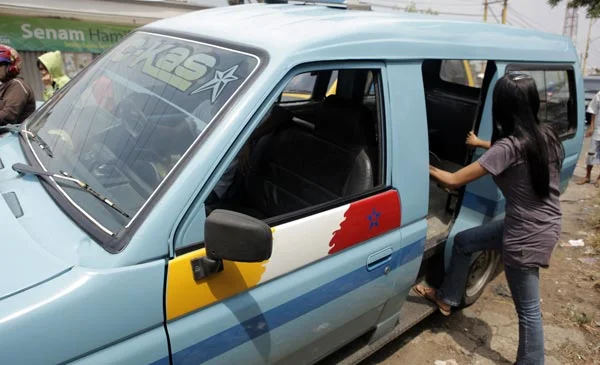English / Bahasa
Before I got status as a permanent worker I had to under go a three month trial period. This was really tough- during this time the pressure is really high. Even if we are feeling really ill there is no way we wouldn’t come to work. Our supervisors often don’t follow the training procedures either. For instance if there is someone that they like or a relative, they are hired, even if they are not good at their work. That’s just what it’s like. So I was relieved when I passed the three month period and got formally accepted as a worker.
To begin with my work was fairly routine. I worked in Section X of the assembly. Section X works on producing just one small part of the shoe which would later be fully assembled overseas. However, this situation changed once I became involved with the union’s activities. I had the opportunity to attend a demonstration in 2009 which demanded for improvements in working conditions and wages. After that, I was removed from Section X. Everyday I was moved to a different part of the factory, it made me feel tired and alone. I know that’s what their aim is—to make me feel unsettled. But so far I’ve been able to put up with it, because I know I’m not alone. There are about 20 of my friends from other sections who are experiencing the same kind of treatment.
There is something else that I’ve experienced with a former factory supervisor that really made me feel sad. At that time I had just got permission to stay home because I was ill for two days. When I came back to work again I handed over the doctor’s certificate to my boss. He took the piece of paper roughly, glanced at it for a second, and then in front of me he thrusts the sheet of paper in the direction of one of my workers (who the boss really trusts) while shouting “You! Take this to Human Resources” His face was really sour. I felt so offended and embarrassed in front of my friends because he was so rude.
Every morning, in our daily briefing, he always lectured us on how to be polite. So I started to question, just because I am an ordinary worker/operator, does that make it ok to treat me rudely like that, where as we as workers are obliged to be polite to our bosses? But that’s how it is, as a worker, I cannot really protest, even though the feeling of injustice aches in my chest.
Read more about my past work experiences.
Why I’m happy to be in a union…
When we join a union we can learn all the proper regulations. So many times we’ve experienced our supervisors mistreating us. If we know the rules, then if our supervisors violate these we have a way to defend ourselves.
In the union there is also this feeling of solidarity. I mean, if we are just sitting in our work station all day every day we don’t get to know people. But if we unionize we get to know this person from that section… we really get to know people.
Why we move to Jakarta
At the factory where I work the majority of workers are migrant workers from central Java, Sumatra and other parts of the archipelago. Lots of people from my part of Sumatra move to Jakarta, there are lots of people from Sumatra in my workplace too. The region in which I grew up has very limited employment opportunities. There isn’t much industry. But we know there is money in Jakarta- so we come here to find work.
In my factory workers are friendly with one another regardless of what part of Indonesia you come from. The union is also the same- we don’t differentiate between different ethnicities. Everyone gets on ok.
Most of us still have a relationship with our birthplaces. If there is a long weekend or extended holiday we will do everything we can to return home to see family and friends—provided we have the money. But if we don’t have much money, we’d go home once a year at the most, usually during Lebaran (the celebratory holiday after the Islamic fasting month).
Ask Sewani…
Sewani is happy to answer your questions about her experiences of life from the factory floor. But please remember Sewani often works long hours and doesn’t have much free time so she may take a few days to respond.
Related Indonesian Entry – Bahasa Indonesia
Tantangan di tempat kerja
Pada awalnya pekerjaan saya rutin saja. Saya bekerja di salah satu bagian di Deparmen X. Deparmen X mengerjakan salah satu komponen sepatu yang dikirim ke luar untuk diselesaikan. Tetapi keadaan saya mulai berubah sejak saya terlibat dengan kegiatan serikat buruh. Saya sempat ikut demo awal tahun 2009, yang menuntut ada perubahan dalam kondisi kerja dan pengupahan. Setelah itu, saya ditarik dari bagian itu. Hampir setiap hari saya dipindah-pindahkan dari satu bagian ke bagian lain, meskipun tetap di Departemen X. Hal ini membuat saya resah dan sedih. Saya tetap bekerja sebaik mungkin, tapi saya merasa tidak ada kepastian kerja. Saya tahu memang itu tujuannya, saya dibuat tidak betah. Tapi sejauh ini saya bertahan, karena saya tidak sendiri. Ada sekitar 20-an teman dari bagian lain juga mengalami hal yang sama.
Ada satu lagi yang pernah saya alami dengan atasan saya sebelumnya, yang benar-benar membuat saya sedih. Waktu itu saya sempat ijin tidak masuk kerja karena sakit selama 2 hari. Begitu saya masuk kerja lagi, saya menyerahkan surat dokter ke atasan saya itu. Ia mengambil kertas itu dengan kasar, meliriknya sebentar, lalu di depan saya, ia melempar kertas itu ke arah salah satu teman (yang dipercaya atasan kami ini) sambil berujar, “Nih, bawa ke HRD!” Mukanya masam sekali. Saya merasa sangat tersinggung dan dipermalukan di depan teman2, karena itu sangat kasar.
Setiap pagi, dalam briefing, ia selalu menasehati kami soal kesopanan…Saya jadi bertanya-tanya, apakah karena saya ini buruh/operator biasa, jadi pantas saja diperlakukan kasar seperti itu, sementara kami sebagai buruh wajib sopan terhadap atasan? Tapi begitulah, sebagai buruh, saya tidak bisa banyak protes, meskipun ada yang mengganjal di hati.
Kenapa saya senang menjadi anggota serikat?
Pertama kalau kita ikut serikat buruh kita bisa tahu aturan-aturanya. Pernah kan dalam pabrik ada penganiayaan dari atasan banyak sekali.
Kalau kita ikut serikat kita tahu penjelasannya kalau atasan melanggar aturan kita bisa membela diri.
Selain itu ada perasaan solidaritas. Karena kan kalau kita sehari-hari di tempat kerja saja tidak bisa mengetahui orang. Kalau kita diserikatkan kita bisa tahu orang ini dari tempat ini… kita bisa lebih tahu orang.
Kami yang merantau ke Jakarta
Di pabrik saya, mayoritas buruh adalah perantau dari Jawa Tengah, Sumatra dan pulau lain di Indonesia. Banyak orang dari tempat asal saya di Sumatra merantau ke Jakarta- banyak yang bekerja di tempat kerja saya juga. Di tempat asal saya lapangan kerja terbatas dan tidak ada kerja di industri tekstil kecuali kalau mempunyai perusahaan sendiri. Di Jakarta kesempatan kerja lebih luas, ada lebih banyak uang di sini, jadi kami merantau ke Jakarta untuk mencari pekerjaan.
Di pabrik tempat kerja saya semua buruh bergaul, tidak dibedakan dari tempat asalnya. Di serikat buruh juga orang berbaur- tidak dibeda-bedakan menurut etnis. Semua ramah-ramah saja.
Kebanyakan perantau tetap ada hubungan dengan tempat asalnya. Biasanya kalau ada libur panjang kita mencoba pulang karena ingin berkumpul dengan saudara, tetapi pulangnya kalau memang ada dana. Kalau dananya sedikit, kami pulang paling setahun sekali, biasanya pas Lebaran.



